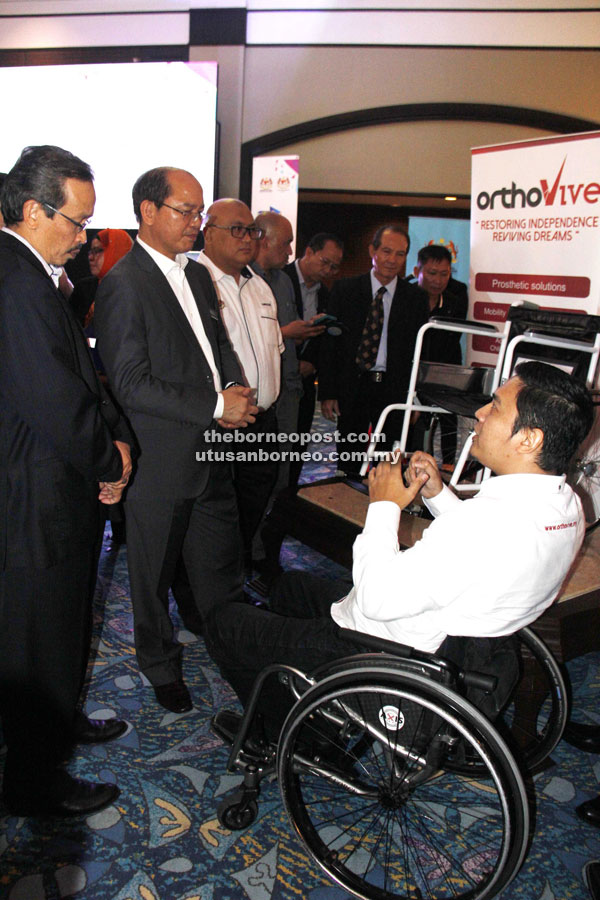
Madius (second left) is briefed on Orthovive during the product launching.
KOTA KINABALU: A total of 130 products and technologies worth RM155 million have been commercialized under the Malaysia Commercialization Year 2016 (MCY 2016) platform last year, said Minister of Science, Technology and Innovation Datuk Seri Panglima Wilfred Madius Tangau.
Madius said 84 out of the 130 products and technologies had entered the market in 2016, including Orthovive, the only product from Sabah.
Orthovive, developed by JB Prosthetic and Rehab Supply Sdn Bhd, is an affordable standard wheelchair targeted at poor people with disabilities.
MCY is a platform to enhance the awareness of stakeholders and the public on the importance and potential of research and development, commercialization and innovation (R&D&C&I) in increasing the nation’s income. The initiative was conducted through the National Blue Ocean Strategy (NBOS) with the Ministry of Finance. One of the main elements of MCY is the shared Key Performance Index (KPI) whereby research agencies or institutes set Special KPIs on commercializing their R&D products or services.
“Last year, some 130 out of the 150 products and technologies targeted under the Special KPI of MCY 2016 have been commercialized,” said Madius at the soft launch of Malaysia Commercialization Year 2017 (MCY 2.0) and networking session with industry players and the media at Nexus Resort Karambunai here, yesterday.
To facilitate market penetration of local R&D products, Madius said 350 techopreneurs had also signed up for capacity building and business matching programmes carried out with MCY 2016 strategic partners such as Malaysian Technology Development Corporation (MTDC), Technology Park Malaysia (TPM), Cradle Fund Sdn Bhd, 1MET, Teraju, Magic, SME Corp and PlatComm Ventures.
This year, he said the MCY 2016 initiative was continued through MCY 2.0, with the objectives to strengthen the commercialization framework or ecosystem, expand the strategic collaboration with industry partners, state and international governments.
“The commitment of 150 products and services under the Special KPI of MCY will be expanded by involving more institutions and agencies, including all public universities.
“This will allow wider opportunities to uncover more Malaysian R&D products that can be commercialized,” he said, adding that Universiti Malaysia Sabah (UMS) would be invited to take part in MCY 2.0.
He also hoped that more research institutions, especially those under the state government, such as the Sabah Economic Development and Investment Authority (Sedia), would be a part of MCY 2.0 as well.
“The MCY 2.0 initiative will emphasize on expanding local R&D&C&I products to both the domestic and international markets,” he said.
Madius said the MCY initiative was in line with the prime minister’s announcement on the National Transformation 2050 (TN50) agenda, with the target to place Malaysia in the top 20 spots in Gross Domestic Product (GDP).
“This effort will be aided by commercialization of R&D products funded by the government which will produce multiplying effects.”
On another note, Madius also highlighted the Sirim-Fraunhofer programme which was aimed at boosting the productivity of small and medium enterprises (SMEs) through upgrading technology and innovation capabilities.
He said a Memorandum of Understanding (MoU) had been signed with Fraunhofer-Gesellschaft, Germany on December 2, 2014, that entailed strategic partnership fields and German innovation ecosystem adaptation with SMEs in Malaysia.
Since the programme was introduced, Madius said up to 336 technology audits had been on SME companies.
Of the 336 SMEs, he said 75 companies were undertaking intervention projects through technology adaptation and upgrading of automation levels in the production process, while eight companies were applying new technologies in their product development and process.
He said 39 small and micro companies had also benefited from the programme through new packaging and labelling, and 26 more were implementing automation and mechanization in their production process.
Additionally, Madius said 46 companies had benefited from SME competency development initiative and adopting innovation culture, among other achievements brought about by the Sirim-Fraunhofer programme.
He said the programme had reduced wastage and inefficiency in the use of raw materials, time and manpower.
“It has also increased the use of automation in the production process, leading to higher productivity.”
“This subsequently contributes to higher sales and profits for SMEs.
“I hope that SMEs in Sabah will grab this opportunity to increase the level of technology application in their business activities,” he urged.
Madius also stressed on the importance of branding, market and consumer research in product development.
On another matter, he said the prime minister was expected to launch the Digital Free Trade Zone Area, the first in Malaysia and the world, which combined physical and virtual zones, along with online and digital services to ease international e-commerce and to stimulate internet-based innovation.
He said the scientific community and industries had to identify R&D niche areas so that Malaysia could have the competitive edge in future development.
“We need to formulate the best strategies so that by 2050, our country will reflect sustainable developments, thriving economy based on science and technology, and a harmonious society as we move towards creating a Smart Community 2050.”
The event also saw the launching of Orthovive and Nahrim Hydraulic Marker (NHM).
Also present were Minister of Science, Technology and Innovation secretary general Datuk Seri Dr Mohd Azhar Hj Yahaya and National Strategy Unit director of the Ministry of Finance, Datuk Dr Aminuddin Hassim.
